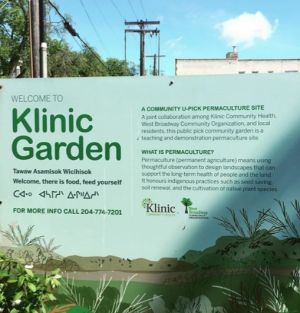Klinic Garden: Difference between revisions
Florez4747 (talk | contribs) (Created page with "|thumb|right|The Klinic Garden's welcome sign") |
Florez4747 (talk | contribs) No edit summary |
||
| (5 intermediate revisions by the same user not shown) | |||
| Line 1: | Line 1: | ||
[[File:KlinicGardenSign.jpg||thumb|right|The Klinic Garden's welcome sign]] | [[File:KlinicGardenSign.jpg||thumb|right|The Klinic Garden's welcome sign]] | ||
The [[Klinic Garden]] is a [[permaculture]] 'U-Pick' community garden in Winnipeg, Manitoba in so called Canada. The garden is led by [[Audrey Logan]] (many people call her ‘Auntie,') and she emphasizes a return to Indigenous place based gardening. The garden is open to the general public to pick any food or medicine freely; Auntie holds group gardening days typically once a week during the growing season, which allows the general public to learn about Indigenous permaculture while contributing to the garden- in this way the garden also serves as a [[knowledge commons]]. Her teachings emphasize that many plants the general public consider weeds have medicinal value (for example thistle is good for liver cleansing, but is often considered a weed.) "Blood Knowledge" is another concept Auntie discusses through her teachings; Blood Knowledge is knowledge passed down to children through their mothers in the womb. Auntie emphasizes that everyone has knowledge about the Earth, plants, and ecology, but it has to be tapped into through experience. <br><br> | |||
[[Blood knowledge]] is a path towards true [[Food Sovereignty]] through the recognition that we are all potential stewards of the earth and can all contribute to the production of local healthy food. | |||
Latest revision as of 02:59, 30 July 2023
The Klinic Garden is a permaculture 'U-Pick' community garden in Winnipeg, Manitoba in so called Canada. The garden is led by Audrey Logan (many people call her ‘Auntie,') and she emphasizes a return to Indigenous place based gardening. The garden is open to the general public to pick any food or medicine freely; Auntie holds group gardening days typically once a week during the growing season, which allows the general public to learn about Indigenous permaculture while contributing to the garden- in this way the garden also serves as a knowledge commons. Her teachings emphasize that many plants the general public consider weeds have medicinal value (for example thistle is good for liver cleansing, but is often considered a weed.) "Blood Knowledge" is another concept Auntie discusses through her teachings; Blood Knowledge is knowledge passed down to children through their mothers in the womb. Auntie emphasizes that everyone has knowledge about the Earth, plants, and ecology, but it has to be tapped into through experience.
Blood knowledge is a path towards true Food Sovereignty through the recognition that we are all potential stewards of the earth and can all contribute to the production of local healthy food.
